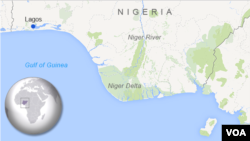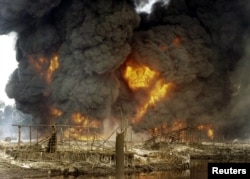An attack on a petroleum pipeline in Nigeria’s restive Niger Delta region last week sent crude gushing into creeks and raised fears of a renewed insurgency in the country’s oil production heartland.
Senator Ben Murray-Bruce says the flow of oil from a ruptured pipeline near the Bayelsa State community of Brass has been stopped. He says he didn’t know how much oil has been spilled.
A spokesman for Italian multinational Eni, parent company of pipeline operator Agip, did not respond to an email for comment.
Last week’s attack marks the fifth time an oil installation in the delta has been sabotaged since the start of the year, said Mike Karikpo, program manager for Nigerian environmental group Environmental Rights Action.
The Niger Delta was previously home to an insurgency by local militants who wanted a greater share of the region’s oil wealth. A 2009 amnesty deal that saw the government provide the militants job training and monthly cash stipends is credited with quelling the violence.
“Given the lull that we’ve had over the last two years or thereabouts, this is... an unusual increase in attacks on oil facilities in the Niger Delta,” Karikpo said.
Possible backlash
Anyakwee Nsirimovu, executive director of the Institute of Human Rights and Humanitarian Law in the oil production hub Port Harcourt, attributed the recent spike in pipeline vandalism to the filing of charges against prominent former militant Government Ekpemupolo, who is known as Tompolo.
The filing of charges against the former militant is one of a string of corruption-related arrests and prosecutions in recent months of politicians and businessmen.
President Muhammadu Buhari vowed to fight corruption after taking office last year. Nsirimovu characterized the recent incidences of vandalism in the delta as blowback from Tompolo’s arrest warrant.
“Whoever is doing this, they are doing that... to, probably think that they’ll be able to stop the federal government from getting Tompolo to [be held to] account,” Nsirimovu said.
Bargaining chip
Karikpo said the reasons for the sabotage are greater than just one man. Nigeria’s government has been trying to wind down the amnesty program, which is increasingly seen as a costly expenditure at a time when the low price of crude is hurting Nigeria’s oil-dependent economy.
He believes whoever is sabotaging the pipelines is doing so to get the federal government to make more concessions to the ex-militants.
“There’s that apprehension by the ex-agitators who have been benefiting from this particular process to get government to come back and see if they can continue the amnesty process and the payments that they do monthly on a permanent basis,” Karikpo said.






